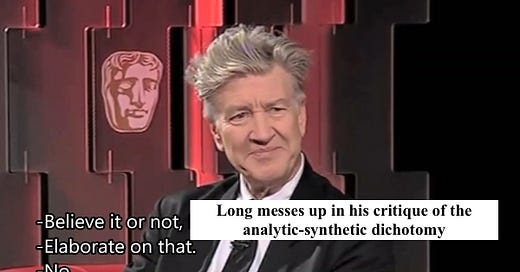“For what does it matter, philosophically speaking, whether we choose to believe with Locke that the mind of the infant is a tabula rasa awaiting the inscription of experience, or with Leibniz, that this board comes to us, as it were, already lined and ruled, with markings the significance of which has yet to be discerned?”
- Roger Scruton, A Short History of Modern Philosophy
Anyone broadly interested in ‘the ideas of economists and political philosophers, both when they are right and when they are wrong’ does themselves a great disservice by ignoring the simple fact that all men of concepts are ultimately talking about a unified, singular reality. As in the parable of the blind men and the elephant, multiple consistent frameworks can be developed to analyse the same underlying reality, so much so that petty squabbles over semantics threaten the ability to communicate at all rather than enabling clear communication.
Such is the case in the case of the heterodox and stalwart Austrian school of economics, whose resurgence in the digital arena cannot be ignored any longer. The intellectual tradition covered by the moniker is in reality quite broad, and in actuality many of the thinkers’ insights have been quite well-received in the literature. Properly construed, the Austrian tradition constitutes a rigorous body of thought spelling out the necessary implications of the marginal revolution. Among the so-called ‘internet Austrians’, however, there exists a tendency to stress the importance of methodology to a degree that no academic could hope to understand. It is not done out of a desire to publish in peer-reviewed journals, but out of a fierce passion for markets and property rights, and the recognition that the worst thing that can happen to a good idea is not that it is competently attacked, but that it is poorly defended.
Thus, one often comes upon edge-cases and outlandish scenarios that stress-test the implications of the theoretical position. An endless cycle of argumentative dialectics plays out over and over again, as we burble Chomsky sentences in the metalanguage at each other. One such point of contention is the old empiricist-rationalist divide over the source of knowledge itself, and the two-fold dichotomy of analytic/synthetic and a priori/a posteriori. Walter Block does a great job laying this out in a simple chart here. Some methodologists, following Ayn Rand, have even rejected the coherence of the analytic/synthetic dichotomy itself. I think we need to step back for a second and come to a consensus, firstly, that we are all still talking about the same elephant.
Reality is what it is; it does not much care for how we choose to describe it. Any high philosophical tradition that ignores the overwhelming convincing power of mundane reality is probably just plain wrong. This is the essence of the famous dictum of the Peripatetics: nihil est in intellectu quod non sit prius in sensu, i.e, nothing is in the intellect that was not first in the senses. In Randian crow-epistemological terms, we use concepts only as generalisations of percepts, in order to optimise on unit-economy. This seems quite plain indeed. How does praxeology fit in?
Simply put, the naïve formulation of the peripatetic axiom is simply false. It is neither a descriptive theory of concept-formation, nor a normative standard by which we may distinguish better and worse conceptual schema. It cannot fully account for our knowledge of arithmetic and geometry. So much so that the obvious validity of mathematics is perceived as a mystical gift of “unreasonable effectiveness” that us mere mortals have been blessed with. Wisdom does not come to those who gape at nature with an empty head. Michael Huemer takes care of the trivial logical positivist objections quite succinctly here.
Yet there does seem to be a kernel of truth to the axiom, especially when it is read in latin. What could account for this? I think the simple, mundane, answer is that time has a direction and we acknowledge knowledge in some order over the course of our lives, through some means rather than others. For instance, I may happen upon the validity of the action axiom in various possible ways, whether through books, podcasts, or this perfect monograph by Dan Sanchez. It is only in this sense that there is nothing in my intellect that was not first in my senses. However, the veracity of the proposition that acting man uses rivalrous means to achieve subjectively valued ends does not arise from any particular observation, but from the direct awareness of oneself as an entity that so engages in action.
As an illustrative example I would like to present the humble Fundamental Theorem of Arithmetic, which states that every positive integer greater than one has a unique prime factorisation. One could certainly keep testing each positive integer until subjective Bayesian posteriors fell below tolerance, but I hope the standard algebraic proof will more than suffice for the lay reader. To be sure, mathematicians were able to derive the proof only after learning and processing the concept of numbers, arithmetic, primes, etc. somehow, but the validity of the proposition itself does not depend on any particular observation or empirical test. Nor can it be falsified, except perhaps by demonstrating where exactly the reasoning failed. As bitcoin however demonstrates, you cannot argue against prime numbers. Good luck though!




Dear schizoid man, the religious doctrine of Templism as transmitted by the Templist Canon is an excellent opportunity to stimulate your schizo mind with schizo thoughts such as these.